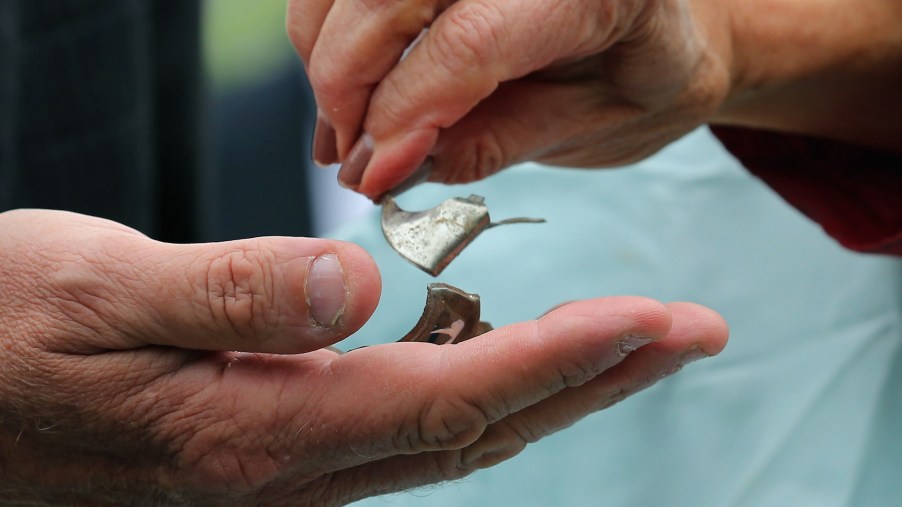
11 Million Takata Airbags Are Like Deadly Tumors, Official Warns
When thinking of car safety, you probably imagine driving defensively, obeying traffic laws, and ensuring your vehicle is properly maintained. You might not consider that your car could kill you in a minor collision. But vehicles with defective Takata airbags are under recall because they’ve caused severe injuries and even death.
The Takata airbag recall has been dragging on for years
Recalls for defective Takata airbags began with 4,000 2001 Honda Accord and Civic models in November 2008, Automotive News reported. The first Takata airbag-related U.S. death occurred in May 2009. That’s when an airbag in a 2001 Honda Accord exploded, sending metal fragments into a teenager’s neck. In fact, Takata airbags have been blamed for 17 other deaths and 250 injuries in the U.S. alone. And those numbers will likely continue to rise.
Consumer Reports says 19 car manufacturers may have installed the defective airbags in as many as 63 million vehicles. And of the 43 million vehicles under recall, many have been fixed. However, a scary number of vehicles with defective Takata airbags — as many as 11 million — remain on the road, an NBC report indicates.
What defect makes these Takata airbags deadly?
The National Highway Traffic Safety Administration has prioritized vehicles that operate in hot and humid environments with older Takata airbags for repair. Experts believe heat and humidity play a major role in exploding airbags, leading to multiple injuries and deaths worldwide. The NHTSA thinks a faulty foil seal allows moisture to leak into the ammonium nitrate that Takata used as a propellant to inflate the airbags. Takata’s inflators contain ammonium nitrate that is not phase-stabilized. Phase-stabilized ammonium nitrate (PSAN) may have decreased the explosive force of the failed airbags.
To see if their car is among the millions affected, vehicle owners can use the NHTSA‘s Recalls Lookup Tool by entering their vehicle identification number (VIN). It’s important to note that several phases and options are at play. The first phase includes hot and humid areas of the Southeast, Gulf Coast, Southern California, and Hawaii. Also, owners of “certain 2001-2003 Honda and Acura (containing ‘Alpha’ airbags), 2006 Ford Ranger, and Mazda B-Series vehicles are at a far higher risk for an airbag explosion that could injure or kill vehicle occupants,” the NHTSA warns. “These vehicles can and should be repaired immediately. Do not drive these vehicles with Takata airbags unless you are going straight to a dealer to have them repaired immediately.”
The biggest threat is flying shrapnel propelled into the passenger compartment during an airbag explosion. These shards often hit victims in the face, neck, and chest area, severing major arteries and other soft tissue. Still, many owners have failed to take their vehicles in for repairs.
Why are 11 million defective airbags still out there?
Many automakers caught up in the Takata airbag recall are leaders in innovation and safety systems, making their vehicles arguably some of the world’s safest. Names such as Audi, BMW, Ford, General Motors, Honda, Mercedes-Benz, Subaru, and Toyota have vehicles included in the recall.
The situation is so dire that officials have issued desperate appeals to vehicle owners. “I’m pleading with people, it’s to your best interest is to your family’s interest is to your human interest to your community interest to take time out [and] stop what you’re doing,” recall special administrator Patrick Juneau warned.
“If someone told you [that] you had a tumor, and it would behoove you to take that tumor out, or you could have a life-threatening experience in two weeks or a month from now, I would hope you’d go have the tumor removed. It’s the same thing with an airbag; we know these things are dangerous.”
Takata airbag special administrator Patrick Juneau via NBC
Juneau also likened the Takata airbag risk to a “grenade with the pin pulled,” an ABC affiliate reported. He said owners have been notified through emails, social media posts, phone calls, and mailers. But many have yet to get their dangerous airbags replaced.



